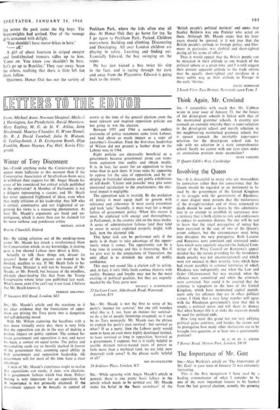Involving the Queen
SIR.—II is distasteful to many who are monarchists by conviction rather than for convenience that the Queen should be regarded as an instrument to be used by the government of the United Kingdom in its struggle with the government of Rhodesia; it must disgust most persons that the- misfortunes of the drought-stricken and of those sentenced to death should be used as levers by this administra- tion in an attempt to establish its supremacy over a territory that it both claims to rule and endeavours to reduce to economic distress. No one will be sad to learn that the royal prerogative of mercy has been exercised in the case of two of the Queen's errant subjects, but the circumstances must bring into disrepute the very prerogative. Both Lazarus and Runyowa were convicted and sentenced under laws which were regularly enacted (the Judicial Com- mittee of the Privy Council on Runyowa's appeal decided that the statute providing for the mandatory death penalty was not unconstitutional) and which were not unusual in their severity, laws which have had recent parallels in colonial territories of which Rhodesia was indisputably one when the Law and Order (Maintenance) Act was enacted, when the offences were committed and when the criminals were convicted. Nor could it be asserted that the sentence is repugnant to the laws of the United Kingdom, which have maintained capital punish- ment only for offences that are in effect political crimes. I think that a very large number will agree with the Rhodesian government's view that this is simply a political move and will share its dismay that when human life is at stake the occasion should be used for political ends.
How long must this grand but not very edifying political game continue, and besides the crown and its prerogative how many other institutions are to be brought into question, or at least into a questionable position?
M. G. DE ST. V. ATKINS
7 Dorset Road, Merton Park, London, SW19


































 Previous page
Previous page